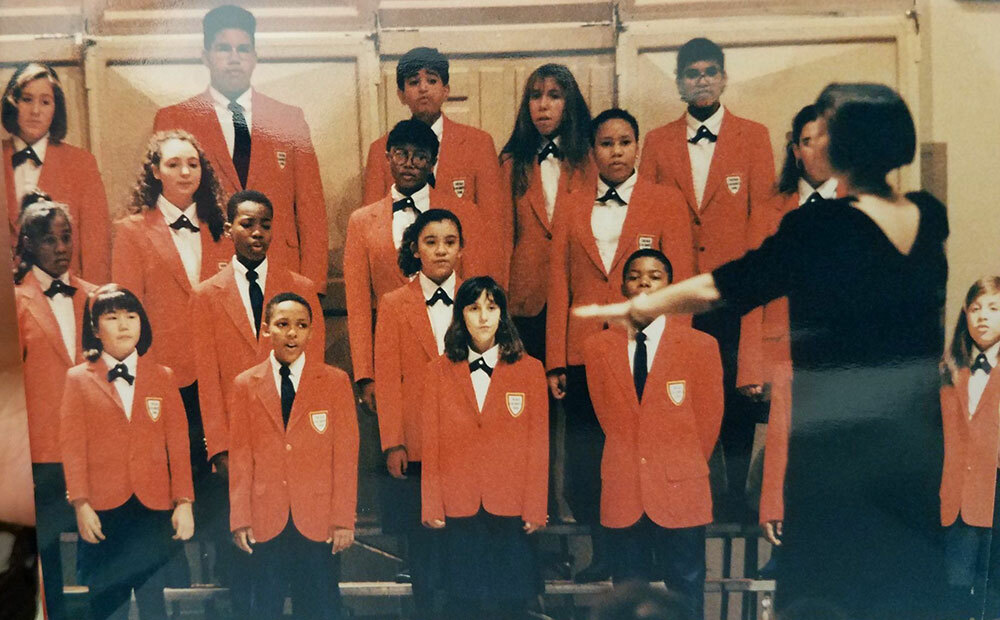
In 1996, Mollie Stone was part of a group of Chicago Children's Choir (now Uniting Voices Chicago) singers that traveled to South Africa. It was a life-changing experience for all of the singers as they met with South African president Nelson Mandela and learned choral music from culture bearers that had endured, battled and survived apartheid. Since that tour, she’s truly embraced the power of choral music, serving as a conductor with Uniting Voices, and teaching the music of South Africa while centering the authentic oral tradition. She currently serves as Choral Conductor and Lecturer at the University of Chicago, directing the University Chorus and Women's Ensemble. We caught up with Mollie to learn how impactful the tour experience was, how to teach music to singers of different ages and what it’s like to go from Chicago Children's Choir singer to Uniting Voices parent.
Uniting Voices: How have you taken the values you learned as a singer and conductor with Uniting Voices to all of your different conducting and teaching posts?
Mollie Stone: Growing up in Uniting Voices, I came to understand the importance of striving for musical excellence, learning the music of many cultures and traditions, and of being part of an organization that brought kids together from different racial, religious, and socio-economic backgrounds through music. I try to bring these values into every realm in which I work. They continue to guide me in all that I do.
UV: What was your favorite touring experience with Chicago Children's Choir?
MS: My favorite touring experience with the choir was our 1996 tour to South Africa. It had such a tremendous impact on my life and on the lives of the other singers on the tour. We witnessed firsthand how Black South Africans used their choral singing tradition to preserve their cultural identity under oppression, and then again to forge a new national identity as "the Rainbow Nation" after the fall of apartheid. We learned music everywhere we went, and we were awestruck by the power of the sound... it was nothing like we ever could have imagined.
UV: You've taught music at many different age levels. How do you handle the different needs of different types of students?
MS: I have worked with singers ages eight up through 100, and I try to treat them all as musicians, rather than as children or students or senior citizens. My goal is to share beautiful, powerful music with them. In order to bring that music to life, we must approach it with deep respect, curiosity and dedication. I have high expectations, and I find that singers experience those expectations not as pressure, but as my sincere belief in their abilities. I'm always amazed at how eagerly they rise to meet these expectations, and even surpass them.
UV: As an alum with a singer in the program, who has also been a part of our staff, how does it feel that your Uniting Voices journey has reached a sort of "full circle" moment?
MS: I am so thrilled to have my older daughter in Uniting Voices, and I can't wait to get my younger daughter in once she's old enough. It really does feel like a dream come true. I know the organization has changed a lot over the years, and I'm excited for my children to experience the things I loved about Chicago Children’s Choir, as well as the things that Uniting Voices Chicago has grown to be today.
UV: What is your favorite live performance you've seen recently?
MS: My favorite live performance that I saw recently was by a Swedish Ensemble called Kongero. They were on tour in Chicago, and performed at Rockefeller Chapel. Their singing is stunningly beautiful. This May, I will get to work with them for the second time, leading a music study program in Sweden.
UV: Anything else you’d like to share with your fellow alumni?
MS: I am so happy that I continue to get to sing with and collaborate with so many singers from every era of Uniting Voices (formerly Chicago Children’s Choir). I make music on a daily basis with other alumni, and I feel so lucky to have so many opportunities to maintain those connections, those friendships, and that sense of gratefulness for all that this organization is, and has always been.